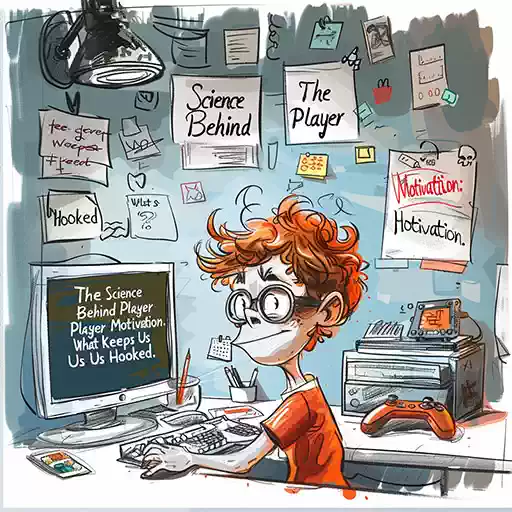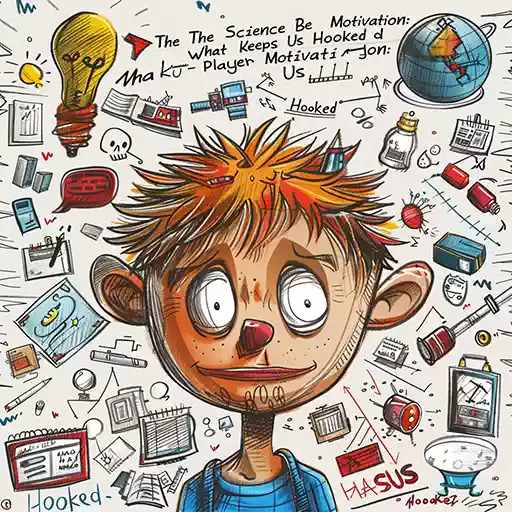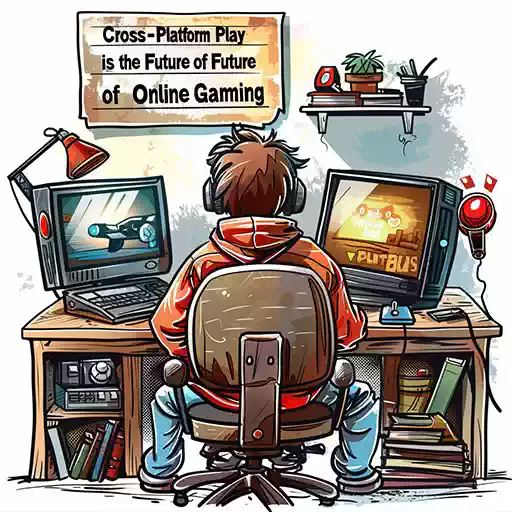The Science Behind Player Motivation: What Keeps Us Hooked
In this article, we’ll dive into the psychology of player motivation, exploring what makes games so compelling and why certain design choices can either make or break a gaming experience. By understanding these factors, developers can craft games that keep players engaged for the long haul.

1. Intrinsic vs. Extrinsic Motivation: The Driving Forces Behind Gameplay
Before we explore specific game mechanics, it’s important to understand the basic psychological principles of motivation. Motivation is generally split into two categories: intrinsic and extrinsic. Both play a crucial role in keeping players invested in a game.1.1 Intrinsic Motivation: The Joy of Playing
Intrinsic motivation refers to the inner drive to do something purely for the satisfaction it brings. In gaming, this could mean solving a complex puzzle simply because it feels rewarding or exploring a new world because it sparks curiosity. This type of motivation is all about the joy of playing.Games that rely heavily on intrinsic motivation tend to be more about the experience than the rewards. Think of titles like Journey or Stardew Valley—these games don’t necessarily offer big rewards, but they captivate players through emotional engagement, creativity, or a deep sense of exploration.
When a game taps into intrinsic motivation, players don’t need external rewards to stay hooked. They play because the act of playing itself is fulfilling. At FOGYX, we strive to design games that balance challenge with creativity, making sure the journey is just as enjoyable as the destination.
1.2 Extrinsic Motivation: Rewards That Keep You Coming Back
On the flip side, extrinsic motivation involves playing to earn rewards, whether it’s points, in-game currency, or unlocking new levels. This type of motivation is built on the idea of external rewards that encourage players to keep going. It’s the thrill of leveling up in Fortnite, collecting rare items in World of Warcraft, or finishing a daily quest for a special reward.While extrinsic motivation can be a powerful tool for keeping players engaged, it’s important to strike a balance. Over-reliance on external rewards can make the game feel like a grind, where players are simply chasing the next dopamine hit rather than genuinely enjoying the experience. Successful games blend both intrinsic and extrinsic motivators, ensuring players find joy in both the journey and the rewards.

2. The Psychology of Achievement: Why Progression Systems Work
One of the most effective ways to keep players hooked is through achievement and progression systems. Our brains are wired to enjoy making progress, and games leverage this by providing clear goals and milestones to hit. Whether it’s earning achievements, leveling up, or unlocking new abilities, progression systems create a sense of accomplishment that motivates players to keep playing.2.1 Mastery and Skill Development
Progression systems tap into the human desire for mastery. We love the feeling of getting better at something, and games often offer structured opportunities to improve our skills. As players progress, challenges become more complex, requiring them to learn new strategies, improve reaction times, or refine their problem-solving abilities.Games like Dark Souls are famous for this. While incredibly challenging, the game’s difficulty forces players to develop their skills. Every hard-fought victory feels earned, providing a deep sense of satisfaction and accomplishment. This mastery loop keeps players engaged long after other elements of the game might lose their novelty.
2.2 The Power of Small Wins
Another psychological principle at play in progression systems is the concept of small wins. Games are masters at breaking big goals into bite-sized tasks, allowing players to achieve frequent, small victories. These mini-achievements activate the brain’s reward system, releasing dopamine and providing a quick burst of satisfaction.Take Candy Crush, for example. Every time you clear a board or complete a level, it’s a small win that encourages you to move on to the next challenge. This steady stream of victories helps build momentum, keeping players engaged even when the larger goal seems far off.

3. Social Interaction: Gaming as a Shared Experience
Human beings are inherently social creatures, and many games tap into our desire for connection and competition. Social interaction plays a huge role in player motivation, whether it’s through multiplayer modes, leaderboards, or cooperative gameplay. Games that allow players to interact with others create a sense of community and competition that can be incredibly motivating.3.1 The Influence of Competition
Competitive games like League of Legends or Call of Duty tap into our drive to be the best. Whether it’s climbing ranked ladders or outsmarting opponents, competitive games trigger our desire to prove ourselves. Winning against another player feels far more rewarding than beating an AI, because it’s a tangible measure of skill.However, it’s not just about winning—losing can be just as motivating. When players lose, they’re often driven to improve and try again, creating a feedback loop of competition and growth. At FOGYX, we design our competitive systems to encourage players to learn from their losses and come back stronger.
3.2 The Power of Cooperative Play
On the flip side of competition is cooperative play, which emphasizes teamwork and camaraderie. Games like Overcooked or Destiny 2 are built around the idea of working together with others to achieve a common goal. This taps into our need for social connection, making the gaming experience feel more personal and rewarding.When players cooperate, they often form bonds with their teammates, turning gaming into a shared experience. The sense of being part of a group, working toward a common goal, can be a powerful motivator to keep playing, especially when victory relies on each member’s contribution.

4. Immersion and Flow: Losing Yourself in the Game World
One of the most compelling reasons players stay hooked on a game is the state of immersion. When you’re fully immersed in a game, time seems to disappear, and you become completely absorbed in the experience. Psychologists refer to this state as flow—a mental state where everything clicks, and the challenges you face are perfectly matched with your skill level.4.1 The Balance Between Challenge and Skill
Achieving flow in a game requires a delicate balance between challenge and skill. If a game is too easy, players get bored. If it’s too hard, they get frustrated. But when a game hits the sweet spot—where the challenges are difficult enough to keep players engaged, but not so hard that they feel impossible—it creates a sense of flow that keeps players coming back.Games like Celeste or Hollow Knight are great examples of this. Both games present players with tough challenges, but they also provide the tools and mechanics necessary to overcome them. When players finally conquer a particularly difficult level, they experience a rush of satisfaction that drives them to keep playing.
4.2 World-Building and Narrative Engagement
Immersion isn’t just about mechanics—it’s also about world-building and narrative engagement. Games like The Witcher 3 or Red Dead Redemption 2 hook players not just with gameplay, but with the depth and richness of their worlds. Players become emotionally invested in the characters, the storylines, and the world itself.A well-crafted game world can create an emotional connection that keeps players engaged for hours on end. Whether it’s exploring a sprawling open world or unraveling a complex narrative, the depth of immersion is a key factor in long-term player retention.
5. The Role of Rewards: Loot, Skins, and Customization
Rewards play a crucial role in player motivation, especially in games that offer customization and loot. Whether it’s unlocking a rare weapon, finding a powerful item, or customizing your character’s appearance, rewards provide a tangible sense of progression and achievement.5.1 The Thrill of Random Rewards
Many games, especially those with loot systems, tap into the psychology of random rewards. Games like Diablo III or Destiny 2 use randomized loot drops to create a sense of excitement and unpredictability. This taps into the brain’s reward system in the same way that gambling does—players never know what they’re going to get, but the potential for a big payoff keeps them coming back.While random rewards can be incredibly motivating, it’s important for developers to balance them carefully. Over-reliance on randomness can lead to frustration if players feel like they’re being cheated out of rewards they’ve earned.
5.2 Customization and Personal Expression
Customization is another powerful motivator. Games that allow players to customize their characters, gear, or environment give them a sense of ownership and personal expression. Whether it’s designing the perfect outfit in Fortnite or crafting a unique spaceship in No Man’s Sky, customization taps into our desire to stand out and express ourselves creatively.When players can personalize their experience, they’re more likely to feel connected to the game and invested in their progress. At FOGYX, we recognize the value of allowing players to make the game their own, which is why we incorporate extensive customization options into our designs.
Conclusion: The Science of Engagement
At the end of theday, the science behind player motivation is about understanding human psychology and designing experiences that tap into our innate desires for achievement, connection, and self-expression. Whether it’s through progression systems, social interaction, or the thrill of rewards, games that master these elements can keep players engaged for hours—if not years.
At FOGYX, we aim to combine these motivational factors in ways that create compelling, immersive experiences that resonate with players on multiple levels. By balancing intrinsic enjoyment with extrinsic rewards, fostering both competition and cooperation, and offering deep worlds to explore, we strive to build games that not only entertain but inspire. Because in the end, a great game is one that speaks to both the mind and the heart—keeping players hooked for all the right reasons.
16 November 2024
More articles

Imagine jumping into a multiplayer game with your friends, but instead of worrying about which console or platform they’re using, you can all seamlessly join the same session—whether they’re on a PC, PlayStation, Xbox, or even a mobile device. This is the promise of cross-platform play, and it’s transforming the way we experience online gaming. At FOGYX, we recognize that gaming has become a social experience as much as it’s about individual achievements.

In the modern gaming industry, developers have access to vast amounts of data that can be harnessed to improve the overall player experience. At FOGYX, we understand that creating a successful game goes beyond just beautiful graphics or engaging gameplay—it’s about continuously refining the player experience to ensure that each user feels connected, challenged, and entertained. The key to this refinement is data.

Creating immersive and engaging game worlds is a delicate blend of art, technology, and storytelling. At FOGYX, we don’t just aim to produce online games or free games that entertain—we want to build virtual universes that captivate, inspire, and keep players coming back for more. From the first sketch of a concept to the final polish on a detailed landscape, there’s a creative process behind each game world we develop, a journey that shapes the very heart of the player’s experience.
all articles
